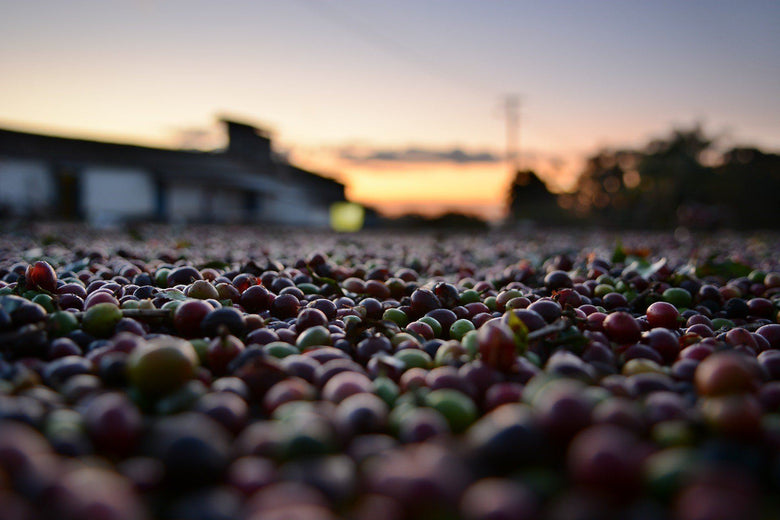Ever wondered what the “natural process” is when you’re staring at a coffee shop menu or website? While most specialty coffee shops proudly display how their coffees were roasted, few actually explain what it means very well.
I’ve been in your shoes. I remember being too nervous to ask what it meant. So I just looked it up online. Back then, there wasn’t much great information. Now, you have me (and this article)!
Understanding what the natural process is can have some very practical benefits for you. For starters, you’ll be able to anticipate a coffee’s flavor before you even taste it. That means, consequently, you’ll more easily be able to buy coffees that better suit your flavor preferences.
Read: How To Find The World’s Best Coffee
Basically, coffee tasting super powers.
All you have to do is be able to wrap your mind around the basics of the three major processing methods: washed, natural, and honey. This blog, as you already know, is devoted entirely to the natural process.
It’s bold. It’s exotic. It’s exciting.
I know you’re eager to dive in, so let’s do it!
Basics Steps Of The Natural Process
The natural process begins like its cousins: it all starts with a cherry on a plant.
These cherries (typically filled with two coffee beans) are harvested by hand or mechanically and brought to a processing station. Sometimes a large farm has a processing station that serves the farms around it. Sometimes farms band together to create a co-op station.
In the case of the natural method, the station often comprises of a warehouse or two, large patios or raised beds, and a couple large pieces of machinery.
Now begin the basic steps of the natural process. Don’t forget that, while there’s a general outline of steps, every processing station has its own little spin on a step or two. Since we’re talking about a method that is used all over the world, there are bound to be differences.
Read: Getting Started With Specialty Coffee: Essential Equipment
First, The Sorting
The cherries in the natural process are sorted by hand, unlike cherries from other methods. The perfectly ripe cherries are sent to one pile and the rest are sorted according to ripeness.
The Long Drying Stage
The cherries, fully intact, are then laid on large patios or raised beds and left to ferment and dry for 2-4 weeks. Yup, it takes a long time, depending on the humidity and rainfall. They are raked frequently to avoid the growth of mold or insects.
Sometimes mechanical dryers are used instead to quicken the process.
The drying stage is extremely important. If the cherries dry too far, the beans will crack and break during the next stage. If they’re too moist, the flavor will turn sour.

Hulling + Extra Drying
The dried cherries are now a dark purple color and aren’t as round as they once were. They’re sent to special hulling machines that rip the dried fruit from the coffee beans.
This process is also known as the dry process.
Who Uses The Natural Process?
The natural process is the original coffee processing method. Before farmers invented complex washing stations, they just laid the cherries out. It was easy, it was simple.
Read: Why Fresh Coffee Is The Best Coffee
Many regions still prefer this process, particularly ones where there is very little rainfall or water. It simply wouldn't make any sense to use a bunch of water for the washed process in areas where water is scarce.
Africa, Brazil, and the Middle East produce a large portion of the world’s natural coffees. Ethiopia, the birthplace of coffee, is also the spiritual birthplace of the natural process.
Unfortunately, this process takes a long time. And with more time comes more opportunity for mistakes. There’s a lot of room for error: over fermentation, off flavors, mold.
Most naturally processed coffees aren’t of very high quality. However, the ones that are well taken care of are not only great, but mind-blowing.
What Do Natural Coffees Taste Like?
Natural processed coffees feature a robust body and flavor that’s wild and complex. The long fermentation and drying stage allows the fruity flavors of the cherry to be absorbed by the beans, giving natural coffees intense fruity notes and aromas.
Read: How To Taste Coffee Aroma
Being able to taste the cherry does come at a cost, however. Since it’s so wild and fascinating, it reduces the overall flavor clarity by muddying the flavors together. You sacrifice flavor clarity but gain more robust flavors.
These coffees tend to have a noticeably heavier body and a mild acidity.
If you’ve been to many specialty coffee shops, you’ve no doubt noticed that many of them favor naturally processed Ethiopian coffees. They’re rich, aromatic, bold, complex, fruity, and exotic tasting.
---
Now that you know about the natural process and how it affects your coffee’s flavors, you should explore the other methods: the washed process and the honey process.
Next time you enjoy a mug of naturally processed coffee, try to taste what I’m describing. Since these coffees tend to be pretty different, I have no doubt you’ll be able to. And trust me, being able to taste how your coffee was processed is quite rewarding.
The best way to really learn to taste the differences between the main coffee processes is to try them back-to-back. This gives you a chance to compare tasting notes while the memory of the previous coffee is still fresh on your mind.
Images courtesy of Counter Culture Coffee


